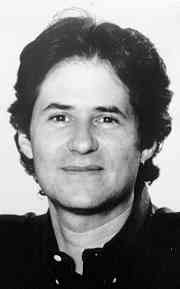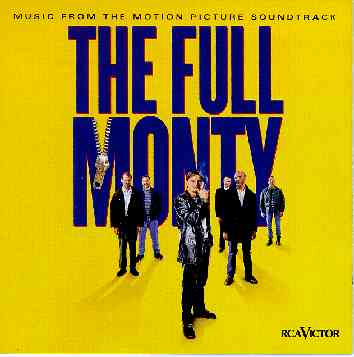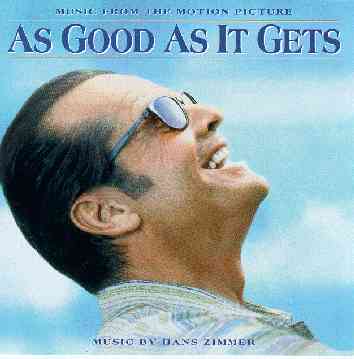Film Music on the Web (UK)
Music Webmaster Len Mullenger
*****************************************************************************
70th Academy Award WINNERS 1998.
****************************************************************************
Music Categories
Original Score (Musical or Comedy):
Anne Dudley for The Full Monte
[recorded on RCA 09026-68904-2]
This was one of only two British Oscars. It was awarded for Anne Dudley's
score which featured Hot Chocolate's 1976 hit "You Sexy Thing".
See further comment below
Original Score (Drama):
TITANIC
TITANIC went down with 11 Oscars equalling the record set by Ben Hur, including
Best Original Dramatic Score and Best Original Song for "My Heart will go
on" sung by Celine Dion (James Horner, Will Jennings). The other Oscars were
for: Best Picture, Best Director (James Cammeron), Best Editing, Best Costume,
Best Sound, Best Sound Editing, Best Visual Effects, Best Art Direction and
Best Cinematography.
"I am King of the World" - James Cameron at the Award
Ceremony
Our Previous Review:
 James Horner
James Horner
 Sony SK63213
[72:31]
Sony SK63213
[72:31]
 This new album adds more lustre
to James Horner's growing portfolio of outstanding film scores which includes:
Aliens, The Rocketeer, Field of Dreams, Patriot Games, Clear and Present
Danger, Braveheart and Legends of the Fall.
This new album adds more lustre
to James Horner's growing portfolio of outstanding film scores which includes:
Aliens, The Rocketeer, Field of Dreams, Patriot Games, Clear and Present
Danger, Braveheart and Legends of the Fall.
Everybody knows by now how Titanic confounded the critics who poured
scorn on it while the film was still in production. Titanic has created box
office history by being the first to pass the $1billion ticket sales mark
and it has gathered critical as well as popular favour rather, one imagines,
for the awesome computer-aided special effects than for the romance between
Leonard DiCaprio and Kate Winslet. The latter is celebrated with the theme
song My Heart Will Go On sung by Celine Dion on the final track of
this CD to boost its popularity into the popular charts (it has sold 5 million
copies already and is at the top of the UK charts - an unusual phenomenon
for a mainly orchestral recording). The song, with quite inane lyrics, is
more of an incidental bonus. The real film music enthusiast will be drawn
more to the excellent and often thrilling music which forms the core of this
score - the central six tracks underscoring the voyage and sinking of the
great ship. Horner is a master at enhancing on-screen atmosphere, drama and
suspense. For Titanic, he uses a huge orchestra with a huge percussion
section including snare drum, bass drum and anvil plus an array of treble
percussion instruments augmented by synthesisers used sparingly and cunningly
to add to the excitement and tension. In the cue Hard to Starboard,
for instance, the urgent rhythm of the snare drum is a warning - almost
Morse-code like - of imminent danger, and heavy ostinatos of the bass drum
and anvil etc evoking the huge engines pounding and pushing the ship towards
disaster; and, in Sinking, the music only too vividly conjures up
pictures of panic and frenzy as people crush to escape, and of rending metal
before the great hulk disappears below the waves. Elsewhere much of the scoring
uses Irish pipes and Irish folk-song inflected music to wistful and
romantic-dramatic effect - presumably to evoke the Titanic herself (does
Horner think of her as the true heroine?) since she was built in Ireland
- as much as the fate of the Winslet and DiCaprio characters (who are American).
There is also a reference back to Horner's own music for The Rocketeer
used as a sort of aspirational motif in the departure from Southampton
sequences and recalled almost as a gentle requiem in the spectral An Ocean
of Memories cue that shows subtle influences of Debussy and Ravel. The
sound is stunning: the dynamic range and sound perspectives are very impressive.
This score should favour Horner for an Academy Award.
tar.gif)
Ian Lace
****************************************************************************
70th Academy Awards -1998
JAMES HORNER
*****************************************************************************
 James
Horner has composed the music for a number of memorable films in the last
two decades, winning three Grammys, five Oscar nominations and four Golden
Globe nominations for his work. His most recent score, for writer James
Cameron’s Titanic, was released by Sony Classical in late 1997.
James Horner is best known for his scores for Apollo 13, Braveheart, Legends
of the Fall and Aliens, and the song “Somewhere Out
There” from An American Tail, all of which have won him Academy
Award nominations. He also wrote scores for the recent releases: The
Devil’s Own, Ransom, Courage Under Fire, To Gillian on Her 37th Birthday
and The Spitfire Grill.
James
Horner has composed the music for a number of memorable films in the last
two decades, winning three Grammys, five Oscar nominations and four Golden
Globe nominations for his work. His most recent score, for writer James
Cameron’s Titanic, was released by Sony Classical in late 1997.
James Horner is best known for his scores for Apollo 13, Braveheart, Legends
of the Fall and Aliens, and the song “Somewhere Out
There” from An American Tail, all of which have won him Academy
Award nominations. He also wrote scores for the recent releases: The
Devil’s Own, Ransom, Courage Under Fire, To Gillian on Her 37th Birthday
and The Spitfire Grill.
He is creating and will shortly record a symphonic work for orchestra and
chorus built on themes from his Titanic score. This work will include
additional music composed for Titanic that does not appear on the soundtrack
recording (see review Sony SK 63213).
Sony Classical also plans to record an original ballet score composed by
Horner, who has written a number of concert works for orchestra.
The composer’s early interest in avant-gared musical techniques helped
define his personal style, which often blends traditional harmonies and a
conventional orchestral palette with the texture of ethnic instruments and
even electronic sounds. Film scoring became an obvious choice for Horner,
though he brings to it the perspective of the classical composer and conductor.
“Films speak to me right away,” he commented. “The atmosphere,
the overall mood dictates the kind of orchestra I will use. Watching a film
the first few times, I make a charcoal sketch; later I put the colours in.”
In recording his own film scores, Horner often creates his own orchestrations
and prefers to conduct the orchestra directly to picture, instead of using
click tracks or other mechanical timing devices.
Los Angeles-born Horner began writing for films in 1980, shortly after completing
his doctorate in composition at UCLA, following earlier study at London’s
Royal Academy of Music and the University of Southern California. Horner’s
first assignment was the scoring of a short film entitled The Drought
for the American Film Institute and it led to more work with AFI. He
further developed his craft in the commercial arena at New World Pictures
under the aegis of low-budget producer, Roger Corman. At New World Pictures,
he also forged important long-term relationships with two emerging young
directors - Ron Howard and James Cameron. His contrasting scores for
Brainstorm and 48 Hours (which won him a Los Angeles Film Critics
Association award) helped establish him as an important and versatile new
film composer, just as the symphonic film score became popular again in the
wake of John Williams’s music for the Star War films. Horner went on
to compose scores for such films as: Casper, Clear and Present Danger,
The Man Without a Face, Patriot Games, Sneakers, The Rocketeer, In Country,
Honey I Shrunk the Kids, The Land Before Time, Willow, An American Tail,
The Name of the Rose, Cocoon and Star Trek II: The Wrath of Khan.
Anne DUDLEY. The Full
Monte OST RCA VICTOR 09026 68904 2
 One
regrets having to sound churlish but the awarding of the Oscar to Anne Dudley
for this slight score seems to this reviewer a sop to the Brits because so
many of their 70th Academy Award nominations hopes were disappointed. An
examination of this album shows that Ms Dudley has only contributed two original
cues lasting no more than five minutes or so the rest of the CD comprises
music by others such as You Sexy Thing by Hot Chocolate. I am not denigrating
the quality of Ms Dudley’s work her two cues employed through the film
do emphasise the cheekiness of the men’s stripping farrago and The Lunchbox
has Landed cue with its old fashioned tango rhythms subtly suggests the
underlying plaintive and semi-tragic elements of this rather over-indulged
little story. Much better and more deserving of the Oscar, in my opinion
was the Zimmer score reviewed below
One
regrets having to sound churlish but the awarding of the Oscar to Anne Dudley
for this slight score seems to this reviewer a sop to the Brits because so
many of their 70th Academy Award nominations hopes were disappointed. An
examination of this album shows that Ms Dudley has only contributed two original
cues lasting no more than five minutes or so the rest of the CD comprises
music by others such as You Sexy Thing by Hot Chocolate. I am not denigrating
the quality of Ms Dudley’s work her two cues employed through the film
do emphasise the cheekiness of the men’s stripping farrago and The Lunchbox
has Landed cue with its old fashioned tango rhythms subtly suggests the
underlying plaintive and semi-tragic elements of this rather over-indulged
little story. Much better and more deserving of the Oscar, in my opinion
was the Zimmer score reviewed below

Ian Lace
Hans ZIMMER. As Good As It
Gets OST COLUMBIA/SONY MUSIC Soundtrax 489502 2
 This is another interesting score from Hans Zimmer who wrote the haunting
music for Driving Miss Daisy. Again a tango rhythm plays an important part
but it is more acerbic in line with the quirky, bad tempered Jack Nicholson
character. A smaller chamber orchestra is used heavily accented towards the
strings - frequently producing a rather biting monochrome sound reminiscent
of Bernard Herrmann’s music for Psycho but clearly not so chilling since
this is basically a romantic comedy. More than once, there are hints of
Prokofiev. Warmer romantic music represents the Helen Hunt (a well deserved
Oscar performance) character. There is some very effective polytonal writing
and intelligent yet spare use of instrumentation. I was especially impressed
with Zimmer’s the cue Under Stars, a most imaginative nocturne. An unusual
and inventive, melodic, score. The album also includes songs used in the
film sung by Nat King Cole, Art Garfunkel and Danielle Brisebois.
This is another interesting score from Hans Zimmer who wrote the haunting
music for Driving Miss Daisy. Again a tango rhythm plays an important part
but it is more acerbic in line with the quirky, bad tempered Jack Nicholson
character. A smaller chamber orchestra is used heavily accented towards the
strings - frequently producing a rather biting monochrome sound reminiscent
of Bernard Herrmann’s music for Psycho but clearly not so chilling since
this is basically a romantic comedy. More than once, there are hints of
Prokofiev. Warmer romantic music represents the Helen Hunt (a well deserved
Oscar performance) character. There is some very effective polytonal writing
and intelligent yet spare use of instrumentation. I was especially impressed
with Zimmer’s the cue Under Stars, a most imaginative nocturne. An unusual
and inventive, melodic, score. The album also includes songs used in the
film sung by Nat King Cole, Art Garfunkel and Danielle Brisebois.
tar.gif)
Ian Lace
Return to Film Music Main page
![]() James Horner
James Horner
![]() Sony SK63213
[72:31]
Sony SK63213
[72:31]
 This new album adds more lustre
to James Horner's growing portfolio of outstanding film scores which includes:
Aliens, The Rocketeer, Field of Dreams, Patriot Games, Clear and Present
Danger, Braveheart and Legends of the Fall.
This new album adds more lustre
to James Horner's growing portfolio of outstanding film scores which includes:
Aliens, The Rocketeer, Field of Dreams, Patriot Games, Clear and Present
Danger, Braveheart and Legends of the Fall.
![]()
 James
Horner has composed the music for a number of memorable films in the last
two decades, winning three Grammys, five Oscar nominations and four Golden
Globe nominations for his work. His most recent score, for writer James
Cameron’s Titanic, was released by Sony Classical in late 1997.
James Horner is best known for his scores for Apollo 13, Braveheart, Legends
of the Fall and Aliens, and the song “Somewhere Out
There” from An American Tail, all of which have won him Academy
Award nominations. He also wrote scores for the recent releases: The
Devil’s Own, Ransom, Courage Under Fire, To Gillian on Her 37th Birthday
and The Spitfire Grill.
James
Horner has composed the music for a number of memorable films in the last
two decades, winning three Grammys, five Oscar nominations and four Golden
Globe nominations for his work. His most recent score, for writer James
Cameron’s Titanic, was released by Sony Classical in late 1997.
James Horner is best known for his scores for Apollo 13, Braveheart, Legends
of the Fall and Aliens, and the song “Somewhere Out
There” from An American Tail, all of which have won him Academy
Award nominations. He also wrote scores for the recent releases: The
Devil’s Own, Ransom, Courage Under Fire, To Gillian on Her 37th Birthday
and The Spitfire Grill.

